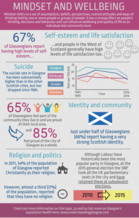Overview
Mindset refers to a set of assumptions, beliefs, perspectives, mental attitudes and ways of thinking held by one or more people or groups of people. It has a strong effect on people's thinking, decisions and behaviour. A practical consequence of a mindset is that it tends to determine our values, preferences and actions, and it influences our well-being and quality of life.
To understand a city, it is important to consider how various mindsets relate to each other and how these might be balanced, used and developed to improve quality of life. At a policy level this might be reflected in questions about the city’s purpose, what it is for, its hopes and aspirations and how these might be pursued. At an interpersonal level it might be reflected in the qualities of relationships with others. This section on mindset includes information about religion, politics, community cohesion and civic pride, national identity, trust, self-esteem, life satisfaction and suicide in Glasgow.
Click on our infographic to see the key facts from this indicator set (we are currently updating the data for this infographic so check back soon for a new version!).
More than half (54.4%) of the population of Glasgow report Christianity as their religion. However, almost a third (31%) of the population, report that they belong to no religion. In the West of Scotland, 62% of the population report never or practically never attending services or meetings related to their religion. This figure is slightly lower than in the rest of Scotland (62% vs 64%). On the other hand, 20% of people in the West of Scotland, compared to 13% in the rest of Scotland, report attending services or meetings once a week or more.
When it comes to politics, Labour was historically the most popular party in the city of Glasgow. However, at the 2015 general election support for the Scottish National Party (SNP) increased dramatically at the expense of all other parties, and the SNP replaced Labour as the party most Glaswegians voted for. The SNP has remained the most popular party in Glasgow at subsequent general elections (in 2017 and 2019). The percentage of people in the West of Scotland who report paying 'a great deal of attention' to politics is very similar to the percentage in the rest of Scotland (16% vs 17%).
More than two thirds of Glaswegians (67%) report having high levels of self-esteem, and the people in the West of Scotland generally have high levels of life satisfaction, similar to those in the rest of Scotland.
In terms of community cohesion and civic pride, most Glaswegians feel part of the community they live in (65%) and are proud of their local area (65%). Even more people feel proud of the city of Glasgow as a whole (85%).
Just under half of Glaswegians report having a very strong Scottish identity (48%), which is slightly less than in the rest of Scotland (51%). Most people in the West of Scotland believe believe other people can generally be trusted (61%).
After an increase in the early 1990s, the suicide rate in Glasgow was fairly stable until around 2005, when it started declining to the current rate of 15.7 per 100,000 of the population. Since 1985, the suicide rate in Glasgow has been substantially higher than in the other Scottish cities, although as a result of the recent decline in suicides in Glasgow and the slight increase in rates in Edinburgh, the suicide rates in the two cities are now very similar (15.7 vs 15.3 per 100,000 of the population).
The data on the Understanding Glasgow website comes from a variety of administrative sources and surveys, and the frequency of updates to these sources varies. The graphs and text on each page should indicate the period to which an indicator refers. In some cases, where more recently published data is not available, we still use older published sources, such as the 2011 Census. Find out more about the timeliness of data presented on this website.
Notes on the data presented
In some cases it has not been possible to obtain data for the city of Glasgow so data are presented for the West of Scotland. In these outputs the West of Scotland is classified as Glasgow City, East Ayrshire, East Dunbartonshire, Inverclyde, North Lanarkshire, Renfrewshire, South Ayrshire, South Lanarkshire and West Dunbartonshire. The data which derives from the Scottish Social Attitudes Survey has a sample size of 345 for the West of Scotland. Data which derives from the British Election Study 2010 has a small sample size (n=63) for the West of Scotland. In the analysis based on the British Election Study 2010 ('Trust in institutions') we have presented data for Scotland as a whole compared to the rest of the UK, as these results are comparable to those obtained using the smaller (less accurate) West of Scotland sample.
Additional Resources
-
ResourceThursday, 26 May 2011
Your Better Life Index
A new, interactive index allowing users to measure and compare their lives. -
ResourceWednesday, 19 August 2009
A Games Legacy for Glasgow
Brochure outlining the potential legacy of Glasgow's role as Commonwealth Games host city in 2014.







